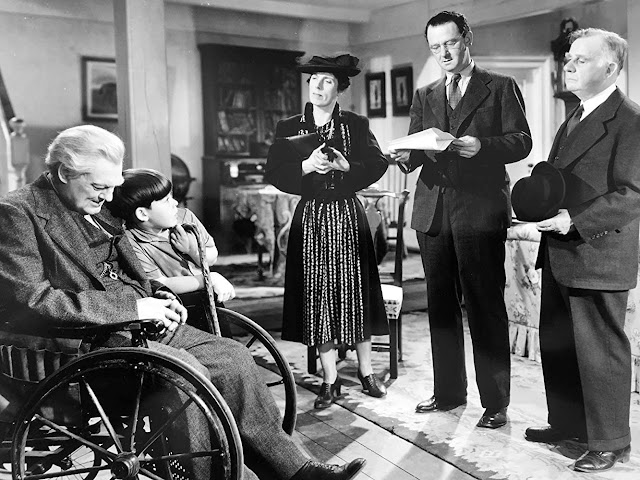Robert Ball Watson (November 11, 1930 – June 27, 1999) credited as Bobs Watson, was an American actor and Methodist minister.
Biography
Watson[1] was a member of the Watson Family, famous in the early days of Hollywood as being a houseful of child actors. He was brother to Coy Watson Jr., Harry, Billy, Delmar, Garry, Vivian, Gloria, and Louise, all of whom acted in motion pictures.[2]
The family, known as "the first family of Hollywood," lived by the Echo Park area of Los Angeles and Bobs attended nearby Belmont High School.
They were honored by the Hollywood Chamber of Commerce by placing the Watson family star on the Hollywood Walk of Fame, at 6674 Hollywood Blvd., Hollywood, California.[3]
Child actor
Watson was best known for his role as "Pee Wee" in the 1938 Metro-Goldwyn-Mayer film Boys Town and its sequel Men of Boys Town (1941), both starring Spencer Tracy and Mickey Rooney.[4] Tracy and Watson became good friends during the making of the first film, and Watson was reportedly Tracy's last visitor before his death in 1967.
In 1939, Watson delivered a fine, tear-jerking performance as Pud, Lionel Barrymore's grandson, in the MGM film, On Borrowed Time. Watson later made guest appearances in many television programs, including The Twilight Zone, Lou Grant, The Beverly Hillbillies, Green Acres, and The Fugitive.
Career
In addition to working in the motion pictures business, Watson went to Claremont School of Theology to become a Methodist minister, inspired from the movie Boys Town. He retired after 30 years of serving in Burbank and La Cañada, California.
Death
Bobs Watson died of prostate cancer in 1999 at Laguna Beach, California. He is interred at Hollywood Forever Cemetery in Los Angeles, California.
Film roles
Life Begins (1932) - Edgar, Harry's Son (uncredited)
Life Begins at 40 (1935) - Meriwhether Son (uncredited)
Two-Fisted (1935) - Eddie - Jimmy's Boxing Partner (uncredited)
Show Boat (1936) - Willie Thomas (uncredited)
Mary of Scotland (1936) - Fisherman's Son (uncredited)
Libeled Lady (1936) - Waif (uncredited)
She's Dangerous (1937) - Small Boy
The Great O'Malley (1937) - Boy (uncredited)
Maytime (1937) - Maypole Singer (uncredited)
It Happened in Hollywood (1937) - Boy (uncredited)
In Old Chicago (1938) - Bob O'Leary as a Boy
Go Chase Yourself (1938) - Junior (uncredited)
Boys Town (1938) - Pee Wee
Young Dr. Kildare (1938) - Little Boy (uncredited)
Kentucky (1938) - Peter Goodwin - 1861
Dodge City (1939) - Harry Cole
The Story of Alexander Graham Bell (1939) - George Sanders
Calling Dr. Kildare (1939) - Tommy Benson (uncredited)
On Borrowed Time (1939) - Pud
Blackmail (1939) - Hank
Wyoming (1940) - Jimmy Kincaid
Dreaming Out Loud (1940) - Jimmy
Dr. Kildare's Crisis (1940) - Tommy, the Crippled Child
Men of Boys Town (1941) - Pee Wee
Scattergood Pulls the Strings (1941) - Jimmy Jordan
Hit the Road (1941) - Pesky
Hi, Buddy (1943) - Tim Martin
The Bold and the Brave (1956) - Bob
Saintly Sinners (1962) - Attendant (uncredited)
What Ever Happened to Baby Jane? (1962) - Clerk in Newspaper Classified Ad Department
Take Her, She's Mine (1963) - Western Union Messenger (uncredited)
First to Fight (1967) - Sgt. Maypole
Mrs. Stone's Thing (1970) - Bartender
Grand Theft Auto (1977) - Minister
References
1. Vallance, Tom (July 6, 1999). "Obituary: Bobs Watson". The Independent. Retrieved 2017-03-08.
2. The Los Angeles Times
3. Pool, Bob. "Star Shines Brightly for Hollywood's First Family; Movies: The Watson clan of former child actors finally receives recognition for its pioneering contribution to films." The Los Angeles Times. April 23, 1999. Metro Part B Metro Desk Page 1.
4. Pee Wee at IMDb
Bibliography
Goldrup, Tom and Jim (2002). Growing Up on the Set: Interviews with 39 Former Child Actors of Film and Television. McFarland & Co. pp. 303–313. ISBN 1476613702.
Holmstrom, John (1996). The Moving Picture Boy: An International Encyclopaedia from 1895 to 1995. Norwich: Michael Russell, pp. 171-172.
Best, Marc (1971). Those Endearing Young Charms: Child Performers of the Screen. South Brunswick and New York: Barnes & Co., pp. 256–259.



















No comments:
Post a Comment